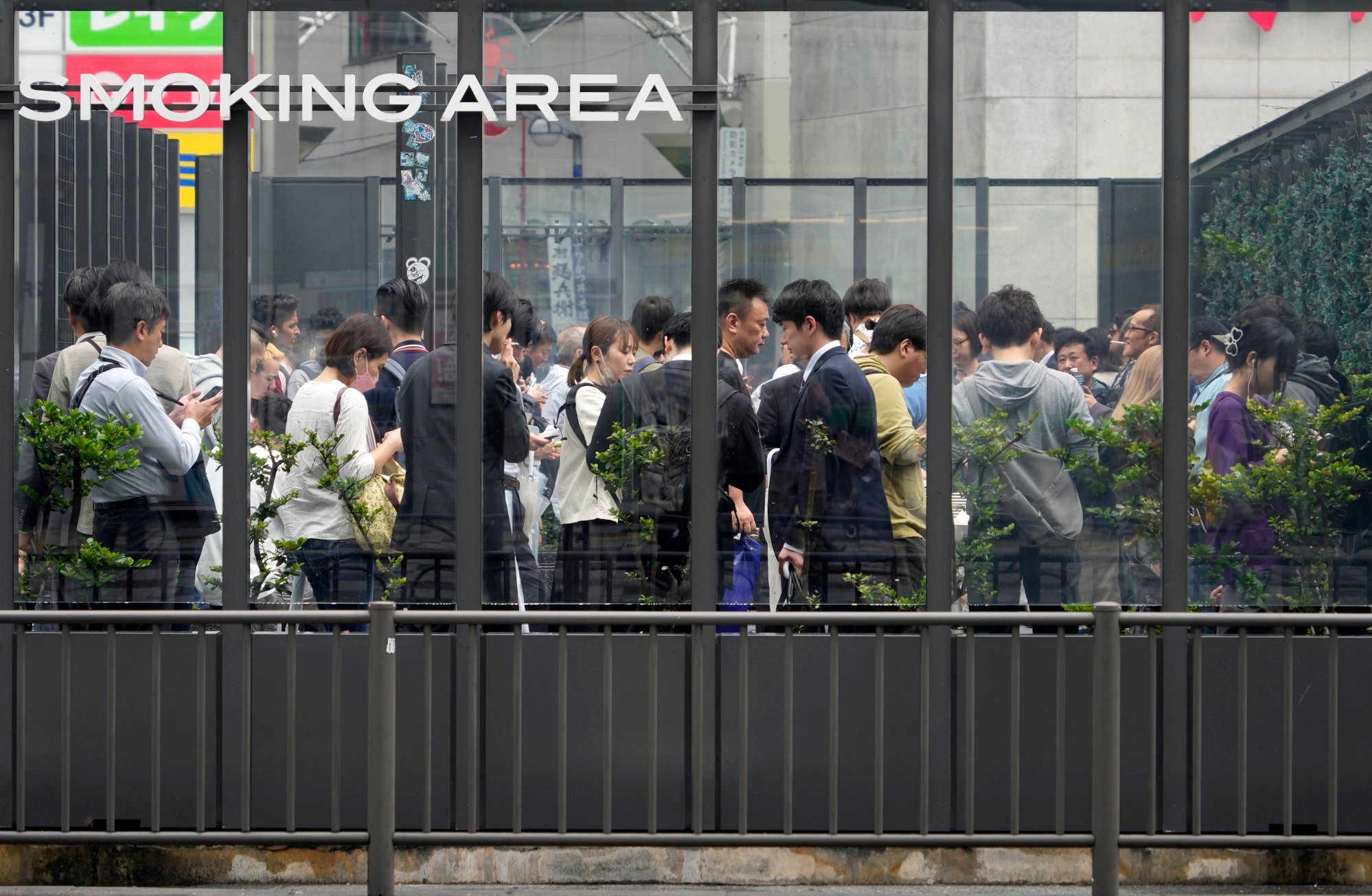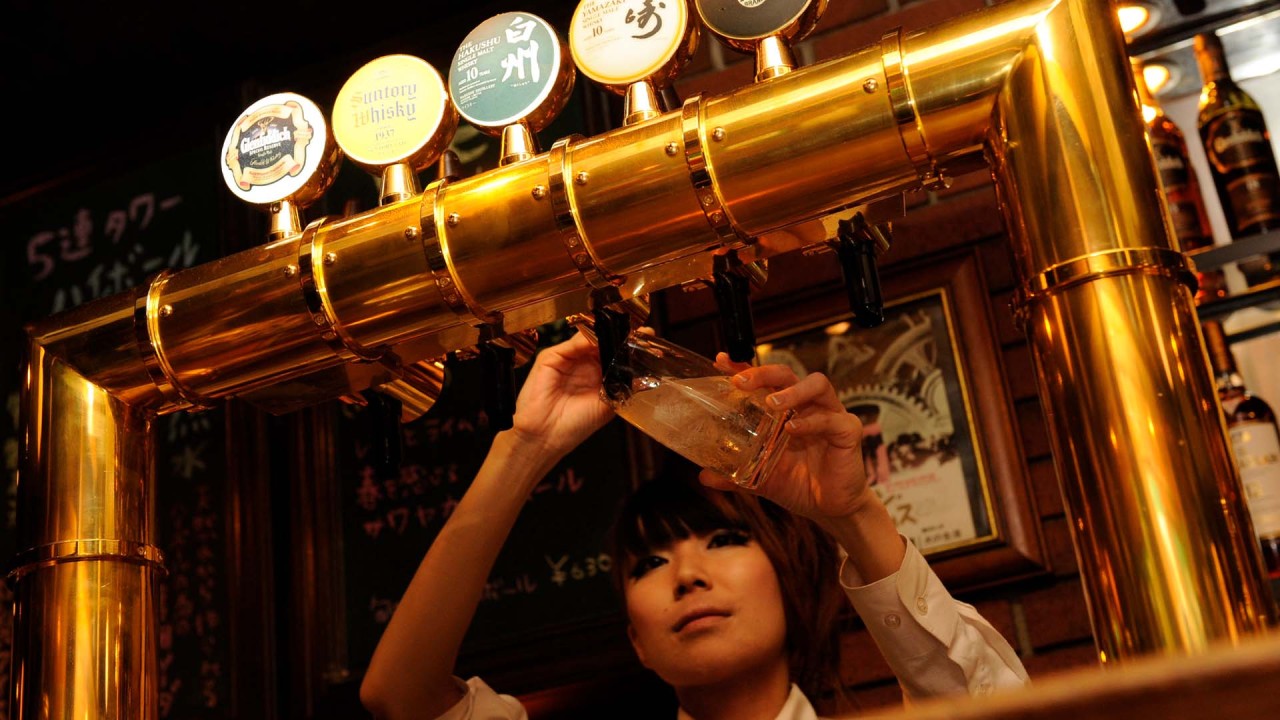
Many workers in Japan embrace smoking at office to puff their way up career ladder
- Most people in a survey cited the professional benefits of lighting up at the workplace, a trend an anti-tobacco advocacy group says won’t last long
For generations, “nommunication” – or drinking with colleagues after work – has been credited with fostering corporate spirit in Japanese firms, releasing office tensions and building close professional relationships.
Now, a new study suggests that despite the well-documented risks to health, smoking performs a similar function in the Japanese workplace.
The research by Clinic For, a Tokyo-based healthcare provider that offers a range of courses to help people stop smoking, on 521 patients found that lighting up helped 56 per cent of respondents to relieve stress and feel relaxed.
The findings, published last month, also showed the unhealthy habit assisted 54 per cent to “change the mood”, while 22 per cent said smoking improved “communication in the workplace”.
Drilling down into this segment revealed that 37 per cent said being with other smokers made it easier to discuss job-related issues and 29 per cent attributed the reduction in work stress to cigarette break.
Another 23 per cent said communal smoking facilitated contacts and beneficial relationships outside their usual workplace connections, and 16 per cent even claimed it helped them with changing jobs within a company or securing a promotion.
In total, 74 per cent said smoking sessions played a role in enhancing their networks and careers.

Shu, a 24-year-old agency worker for a multinational company in the hospitality sector, hoped that making the right contacts might lead to a permanent position with the firm.
“A lot of Japanese companies in the food and beverage sector use haizen staff because they are cheaper but all of us want the security of a full-time contract directly with the employer,” said Shu, who did not want his family name to be used.
“I used to smoke at university but I had pretty much given up, but now I’m back on e-cigarettes because my boss is a smoker as well,” he said, adding knowing the right people and sharing their interests was key to landing a long-term role coveted by many.
Shu shares a few jokes and commiserates with his superior’s work stresses during their brief breaks in the expectation that it may pay off professionally in the future.
“I quite like my boss so it’s not really a problem to smoke with him, but I just hope that the next time there is an opening, he thinks of me,” he said.
Japan’s smoking rate has been declining for many years due to various factors that included greater health awareness, hefty tax on tobacco products and a change in the law in April 2020, which banned smoking indoors in most public places and requiring businesses that do permit smoking – such as bars and restaurants – to provide separate areas for patrons to reduce exposure to second-hand smoke.
A health ministry survey showed that the smoking rate among men in 2022 dropped 3.4 percentage points from the previous poll in 2019. In total, 25.4 per cent of men said they smoked.
The rate among women over the same period shrank 1.1 percentage points to 7.7 per cent.
Men in their 40s remained the biggest consumers of tobacco, at 34.6 per cent, followed by 32.6 per cent in their 50s.
Women in their 50s were the biggest smokers, at 12 per cent, while those in their 40s came behind at 11.6 per cent.
Kyoichi Miyazaki, secretary general of the Japan Society of Tobacco Control, said the “phenomenon” of smoking helping to smooth work relationships would eventually vanish.
“I do not think this is going to last much longer,” he said. “We are seeing young employees refusing to go to izakaya [bars] with their superiors because they do not want to drink and they do not want to spend the money. And fewer people are smoking for similar reasons.”
He added the culture has also changed at large companies where senior staff pressuring juniors to go to drinking parties after work is seen as “power harassment”, although it may be more prevalent at smaller firms.
“Smoking in general is becoming less popular and there has been a real drive since before the Tokyo Olympic Games to create ‘smoke-free’ areas.
“Young people care about their health and even though they say it could help with a promotion, I just think smoking will naturally die out entirely,” Miyazaki said.
Officials from Japan Tobacco and British-American Tobacco Japan declined to comment on the report or the declining trend of smoking in the country.


